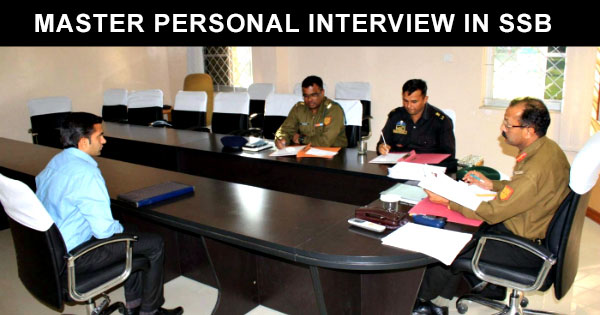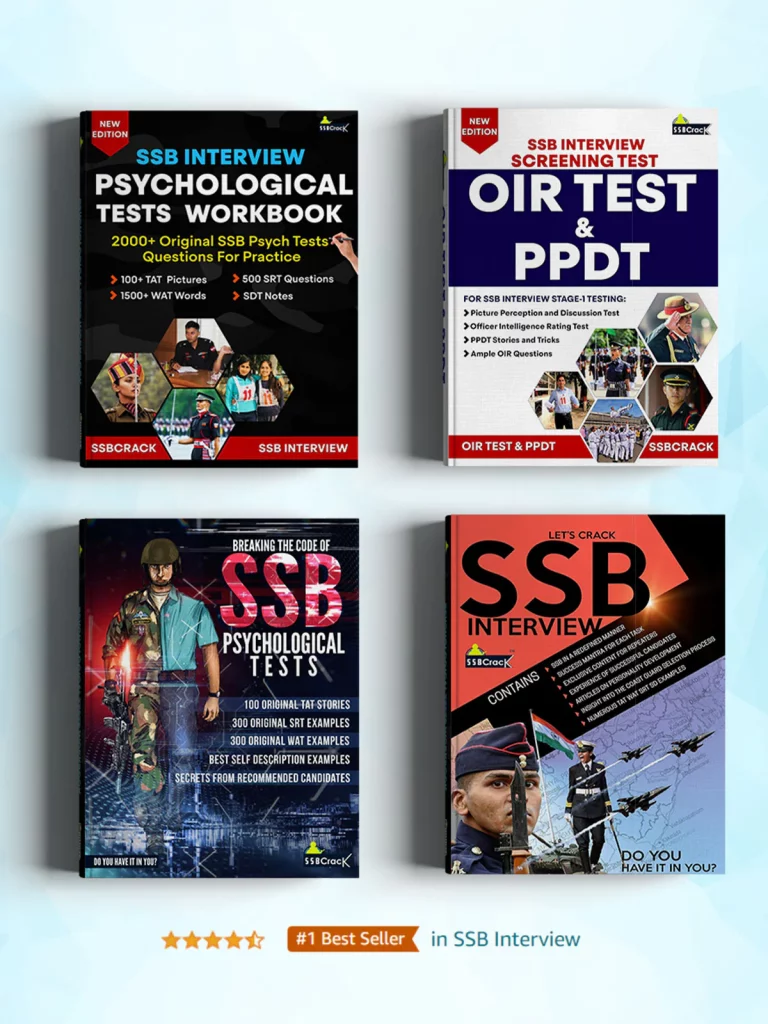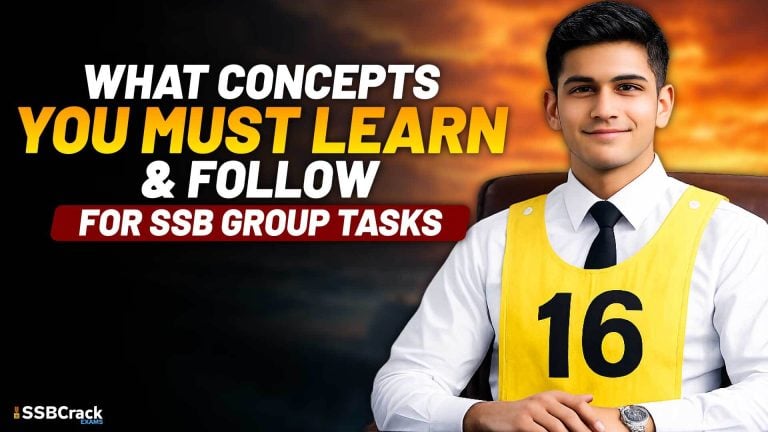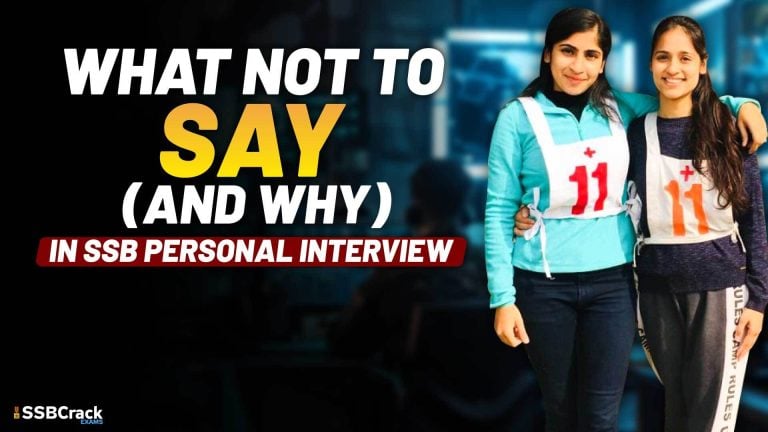It has been said that if a topic is true, then a man can speak it without any problem. But if it is false, or if he has a fear of not accepting the truth, then he will not be able to answer. Most of the aspirants face a lot of problems while going through the Personal Interview at SSB. Many different problems will pop up, which the candidate has never experienced out before in the general world. Having seen a lot of stories and hearing a lot of experiences, I present you here, some basic questions asked in the SSB Personal Interview and how can you answer them. Now that I put these answers here, it doesn’t mean you spit out the same at the interview. However, don’t worry, the officers are very keen and intelligent that they can catch any lie that you speak. Interviewing a personality is absolutely not an easy task. But giving the best of yourself is always appreciable.
Ground Rules to Remember:
- Do not try to fit yourself in some XYZ box. This means it is not true that there is always some set of rules and only if you match with them, you will get selected. There are various processes. Simply, if they had such procedures, they might have already invented a procedure to test you in few hours and send you back home or take in for training. But it isn’t the case. You are being tested in five days by three officers who have patience at a level. They do not test you all day. They just test you for half-day and that too with a cool mind and spirit. This itself indicates what you must do. When your assessor is calm, why should you rush unnecessarily? You to keep calm. When time demands, run. When it doesn’t, keep up your josh high and keep smiling. There is no set of rules that you must be in some XYZ way only. Everyone is unique. Remember that.
- Do not try to teach people. Agree that if you yourself are coming for assessment, do not try to teach others on how to get selected. Most will create a hypocrisy. Unless asked, do not advise. This, you must remember. But do not apply this rule everywhere. Where to apply and where not to apply, I leave it for your discretion. In the end, you need to reach your goals. So keep the fire lit.
- Do not try to copy answers. For a question, many people give many answers. For example, when I ask, “Do you believe in God?”, a person X will answer – “No, I believe in myself.” And a person Y might answer – “Yes, I see God as my mother. I believe her.” When you receive these two statements, you will find both interesting. In that case, you will try to opt one. Some more smart people will try to reframe a completely new answer. All of these ‘might’ help. But the best methodology is, when you get a question, pause, take your own time and answer. Let that answer be the worst one or the simplest one, give what you want to say. Personally, if I receive the question – “Do you believe in God?”, I will answer “Yes.” And that’s it. Why do I believe and all? – this story the officer didn’t ask me. So I won’t answer. This will lead us to the next point.
- Answer to the point. Do not take more than a minute to answer any question unless it demands. When asked “Who is your favourite cricketer?” – you might answer “Sachin Tendulkar sir.” And that’s it. No more stories. He didn’t ask you “Why you like him?”, If the question was “Can you speak about your favourite cricketer?” or if it was like “Who is your favourite cricketer and why?” – then you answer properly by taking your own time. Surely, if you are taking one to two sentences to speak, it is permissible. But if you are talking too much, then it won’t help. Officers will lose interest in you if you keep telling them stories whenever posed a new question. Answer sensibly and what is required. If you want to talk more on it, seek the officer’s permission. Politely ask him – “Sir, can I speak a little more about it?” or you can even ask “Sir, if you permit me, I would like to elaborate my point.” Likewise, you will create a good atmosphere.
- The power of “I DO NOT KNOW”. Let me give you a bit explanation on this. Imagine your brain as a big building. Probably, you can even imagine big bungalows as shown in movies like Suryavansham and all, I don’t care. Or imagine your brain’s building like a very beautiful mansion. But, as per my rules and explanation, you are only allowed to build and have four rooms. And you can’t have many more rooms because your brain can’t grow in its size after an age limit, right? So, name the rooms as follows:
- Room 1: I KNOW: This encompasses all the information that you subconsciously know. All things that include in this room are your name, how to brush, how to walk, how to talk, how to eat, what to eat, etc.
- Room 2: I DON’T KNOW: This room consists of that information that you subconsciously do not know and you aware of the fact that you don’t know it. Things in this might be how many hours it takes for earth to stop rotating, how will your life be tomorrow, anything regarding ‘essential’ things of future and all.
- Room 3: I KNOW THAT I KNOW: This room encompasses the conscious activity that is happening in your brain. This room is the house for all studies and mathematical and logical interpretation. When asked “When did India become independent?” – you can answer “15th August 1947” without even blinking. And you know that what you are answering is correct. This is the room where you sit and make plans for your future.
- Room 4: I KNOW THAT I DON’T KNOW: Probably you will be feeling that I am trying to confuse you. Don’t worry. Read calmly. This is a room that you are extremely aware of. This is the room where your fears live. This room consists not only of the sudden induced fears but also those that you yourself made. No body said that communication is hard, but you yourself might create it as a fear. Or else , it might be anything of your life. Most of the fears are self-induced and these stay happy in this room making your life a messy feast.
- Room 5: I DON’T KNOW THAT I DON’T KNOW: This is the room which all Psychologists try to see. It consists of the fears and attributes that you never know. For example, you never knew you care so much for your body unless you start exercising. Most of the people who have reached pinnacles in their job lives, never knew that they worked just for something that never existed. People worked for money all their lives and in the end, end up spending all of it in hospitals for life support. Or the reverse might also happen. Also, this is a room for all your inbuilt fears. Will the girl like me? Will I get the job? Can I jump that high? Was I so bad? Did I really break his/her heart so much? All of these situations come in this room. So, this is a place that you don’t know something, and you are not even aware of that.
Summary of the Mind Rooms:
Room 1 – I know something subconsciously.
Room 2 – I don’t know something sub-consciously and I am aware of this.
Room 3 – I know something consciously.
Room 4 – I don’t know something consciously.
Room 5 – I don’t know something sub-consciously and I am unaware of it.
But one thing you must remember, “ALWAYS, THERE IS SOMETHING IN YOU. THE QUESTION IS WHETHER YOU KNOW IT OR YOU DON’T, WHETHER YOU ARE CONSCIOUS ABOUT IT OR NOT!” And if you know it, how well you know it is something worth pondering upon.
What you must try to do is try to shift all the information of Room 5 to Room 4. This means, explore yourself and find things that you don’t know that you are unaware of many things. Then you will shift that information to a place where you know that you are unaware of it. Next, try to shift all the information of Room 4 to Room 1. This is a real hard task but this is all the game that you need to follow.
How will these Rooms help you in your growth?
They will try to analyse the information that you have. For example, as a kid, you have been shown darkness as a fear factor to consume the food. At that time, you will consume it. Later, this might show its impacts on the developing factors of your brain. Next time, even when no one is there, you self-induce fear if you stay in darkness. This doesn’t apply only for kids. It applies to everyone at every age. When some person comes out of the interview and says “Bro, the IO is too harsh, he made it tuff for me, I won’t get recommended.”, you yourself induce fear in your mood. Just reframe the situation. Who knows? The same IO might be the one who is fighting for people like you getting recommended? Or that IO might be the one trying to see something unique in you? You never met him, so you have no idea. Just be patient. Wish others good luck and give your interview with a smile and of course, have abundant confidence.
- While filling PIQ form, remember that you need to speak whatever you wrote in the form as per the question asked. You cannot deny speaking any information of the PIQ if the relevant question is asked. However, to speak something out of the box i.e. if you didn’t mention in the PIQ, seek the permission of the interviewer. Also, do not seek too many permissions. It won’t look good.
- Avoid posing fake things done in the PIQ. I have seen people never playing a game, at least not for normal reasons and not any tournaments, and mentioning it in their PIQ. It won’t help.
- A lot of practice is needed to nurture your skills and groom well. Practice speaking fluent English and using good words with appreciable vocabulary. Links are given below about the Articles that deal with this part.
With this, I finish the list of ground rules. Now we will see about how to face the PI properly. Your PI (Personal Interview) is based on the Personal Information Questionnaire (PIQ) form. Fill it carefully. What you write in it, will become the fate of your day of interview. So choose to write things that are true. No body will test you based on your qualifications or certificates. They are just some experiences of your life. What lies within you will obviously come out if you let it. Be conscious of your behaviour and attitude. Attitude is everything – agreed. But an attitude that doesn’t care about others – not appreciable. Everything has its own limits. Analyse yourself.
Questions in the Interview:
| No. | Question asked | Answer most helpful |
| 1. | Introduce yourself. | Speak about something pleasing about yourself. This question is to let you know how well are you feeling and the level of nervousness you pose. If you are not nervous, you will probably answer this properly indicating a few of your educational and employment qualifications and set the right track. |
| 2. | How did your day go? Or How was your day? Is everything fine here? How did GTO and Psychological Tests go? | Keep up smile. Assure what all you are feeling. Do not hesitate to speak up. Keep in mind that you stay only for five days in SSB. In future, no one knows the circumstances. So best policy is to adjust yourself. If there is anything really bothering you, you can speak up. Trust them, they won’t judge you on this, unless the demand is very peculiar. |
| 4. | A rapid-fire round about your school education and other activities. | Listen to all the questions properly. It is advised that you answer all of them in the same order but if you can make up the answer more pleasing and easier for the officer to understand, then even that is appreciable. In a way, either give out your answers according to the timeline – in a way that in so and so year, you have gone through so and so and that goes on for the next years. Or else, the even more useful trick is that you give all your academic information, later the sports and games and then about your other information. |
| 5. | Who is your favourite teacher? Or who is the teacher whom you don’t like the most? | Depends from person to person. It doesn’t mean that you like a Science teacher and so you are good at science and you have better chances of gaining impression. It is absolutely not like that. Questions like these are posed to understand your nature towards studies. |
| 6. | Who is your best friend? And why? | Answer what you know. Do not lie or try to fake impress. Everything will be seen. |
| 7. | How did you manage less marks? Or why did you stop being into sports? | Answer this properly. Do not give fake explanations. Be true to yourself. Justify for the acts what you did in a proper way. If you didn’t go for sport, you must surely maintain a habit of keeping yourself fit. Mention that. |
| 8. | What kind of people you like? | This is a tricky question. As others do, do not try to give a lecture about ‘personality’ in front of the officer. Be clear and crisp and cut short all the cords. Speak up that you usually mingle with XYZ people and you usually don’t like to interact with PQR people. Also, assure the officer that you are aware of that there is no harm in learning something from everyone because everyone is unique. |
| 9. | A rapid-fire round about parents and siblings. | Be clear and not too sweet or shy or embarrassed while saying this. Explain about your responsibilities at home and what all you do and get to receive from your family. Speak up about your parents a little and not too much. It is in this phase people get drifted away from the interview and start thinking about other things. Unless demanded or are stressed by the IO, do not think too much. |
| 10. | Questions regarding the Current Affairs (might be asked as a rapid-fire round too) | Only the one with peace of mind will get a reward in this. I have personally seen many people preparing whole year many topics for the SSB and exactly in front of the IO, their mouths won’t open up. Please release your stress and nervousness. It can be detrimental if you deny calming yourself down. Read all sort of materials and especially, read the newspapers. |
| 11. | Questions regarding the current status of your employment and how you spend your earned money. | Do not try to create a fake impression of the emotion you have on the job. Also, do not try to criticise the company without any reasons. Most people do not know the name of the CEO and Founder of their company. These sort of basic information and all will be asked. You must have a proper explanation of what contribution is yours in that company why do you want to join the Armed Forces. |
| 12. | Why Armed Forces? | Changes from person to person. No judgments on this. |
| 13. | Whom do you like the most – father or mother? OR Whom do you think you resemble the most – your father or mother? | Person specific and individual. |
| 14. | Questions relating to the sports you play. | If you play any sport, have an A to Z knowledge about it. Play with passion. Not just to pass time. |
| 15. | What are your good and bad qualities? How do you overcome your qualities? Or What are those things your father/mother wants to change in you? | Again, no fake words. Speak the truth. If you have something really problematic, then mention what all you are trying to do to overcome them. Do not brag about yourself while speaking about strengths. Being too humble is a sign of highest form of ego. This means that you must never show fake achievements or qualities. |
| 16. | Why don’t you have a girlfriend or boyfriend? | Mature answer matured answers. Simple. Do not give studies or parents as an excuse if you don’t have. Also, it doesn’t mean that if you have one, you have more maturity. It is all about relationship psychology. It is better that I write less in this and give you your own space. |
| 17. | What if you didn’t do this time? | Will try again. |
| 18. | What are your secondary options? | Person specific and individual. |
| 19. | How did you think your Interview went? | Well and good. Gave my best. |
| 20. | Any questions for me? | Person specific and individual. |
Final pointers that you must remember:
- I am not advising you that this is the only way you crack SSB. There is GTO Test and a Psychological Test too. Your performance in them matters as much as in IO.
- Wherever I mentioned “Person Specific and Individual”, I am forcing you to think about yourself from Room 5 of your brain.
- For more information on maintaining body language and improving communication and vocabulary, I would suggest you go through these articles written by Ms. Anuradha Dey, our English SME at SSBCrack Exams:
- https://ssbcrackexams.com/body-language-mistakes-in-ssb-interview/
- https://ssbcrackexams.com/eye-contact-skills-for-the-ssb-interview/
- https://ssbcrackexams.com/4-ways-to-tackle-ssb-interview-questions-you-dont-know-how-to-answer/
Have a nice day. Stay safe at home.
Sources: Enlightened people, many aspirants and recommended candidates.
Jai Hind.








